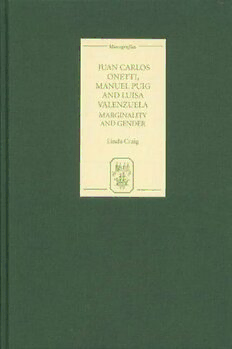
Juan Carlos Onetti, Manuel Puig and Luisa Valenzuela: Marginality and Gender (Monografias A) PDF
191 Pages·2005·0.771 MB·English
Most books are stored in the elastic cloud where traffic is expensive. For this reason, we have a limit on daily download.
Preview Juan Carlos Onetti, Manuel Puig and Luisa Valenzuela: Marginality and Gender (Monografias A)
Description:
Onetti, Puig and Valenzuela have not had the same level of international acclaim as Borges, Garc?a M??rquez or Vargas Llosa, but they are equally intellectually challenging, and their work adds much to the breadth and depth of twentieth-century Latin American literature. This book starts with Onetti's first novella, the intricate, fragmented El pozo, and finishes with Valenzuela's Cola de lagartija, a strange, quasi-baroque work of dark humour and powerful political overtones. It has separate sections on each of the three writers, which balance close readings of selected passages with tightly woven theoretical analysis. The fact that this set of texts is from a specific time and place, the Cono Sur from 1939 to 1983, gives the work intellectual coherence; and it is methodologically consistent in its use of a set of co-ordinates from, amongst other sources, psychoanalytic and feminist theory, from Lacan, Irigaray and Kristeva, which are integrated into the vision of the novels as they are analysed. Onetti, Puig and Valenzuela are seldom viewed together, but Craig argues that their common geography and history are crucial, and that these particular writers share and explore in their work a post-colonial emptiness, a constant questioning of realism and a love of tango.
See more
The list of books you might like
Most books are stored in the elastic cloud where traffic is expensive. For this reason, we have a limit on daily download.
